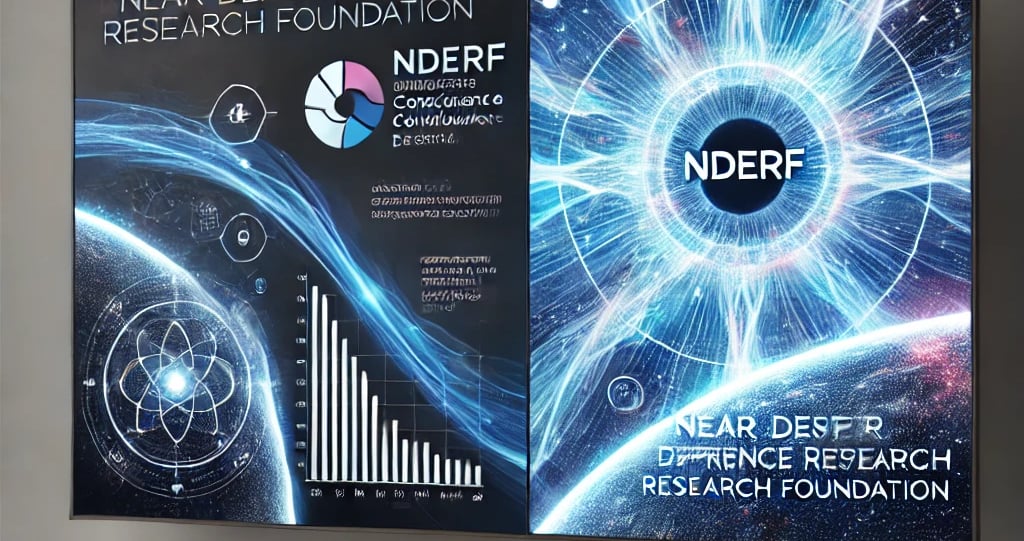Research on life after death
Conreas & Jeffrey Long
2/18/20254 min read


1. Consciousness as Energy
The concept of consciousness as a distinct form of energy has gained increasing attention in both scientific and philosophical communities. This emerging perspective challenges the traditional materialistic understanding of consciousness, suggesting that it may not be merely a byproduct of neural activity but rather a fundamental force that interacts with the universe in ways we are only beginning to comprehend.
Research on consciousness as energy suggests that human experience extends beyond what is perceptible through our five senses. Many individuals who undergo profound life-altering experiences report sensations and awareness that seem to transcend physical reality. One such phenomenon that provides compelling evidence for the immaterial nature of consciousness is the near-death experience (NDE).
NDE accounts often describe consciousness separating from the physical body, perceiving surroundings with heightened clarity, and accessing knowledge beyond normal cognitive capabilities. This raises profound questions about the nature of human awareness, the continuity of identity beyond physical life, and the interconnected nature of existence. If consciousness is indeed a form of energy, it could explain the ability of individuals to access information and perceptions that defy conventional understanding.
This session will explore the hypothesis of consciousness as energy, examine how this perspective aligns with findings from quantum physics and neuroscience, and discuss its implications for our understanding of life, death, and the nature of reality.
2. NDERF: The Near-Death Experience Research Foundation
In 1998, the Near-Death Experience Research Foundation (NDERF) was established with the mission of studying and documenting near-death experiences on a global scale. Over the past two decades, NDERF has become the largest repository of NDE accounts, offering an extensive database of firsthand testimonies from individuals across different cultures, languages, and belief systems.
NDERF’s approach is uniquely empirical, compiling detailed accounts and analyzing their commonalities and variations. These testimonies, available in over 30 languages, provide invaluable insights into the phenomenon of NDEs. The organization works closely with scientists, physicians, and philosophers to interpret these experiences from both medical and spiritual perspectives.
Some of the core objectives of NDERF include:
Systematically documenting NDE reports to identify recurring patterns.
Conducting rigorous scientific analysis to validate key aspects of NDEs.
Providing a public platform for experiencers to share their stories.
Collaborating with researchers across disciplines to explore the broader implications of NDE findings.
This session will showcase NDERF’s contributions to the study of consciousness, highlight key discoveries from its vast database, and discuss the evolving role of empirical research in understanding NDEs.
3. The Phenomenon of Consciousness in Near-Death Experiences
NDERF research has revealed striking patterns in the descriptions of NDEs, providing compelling evidence that consciousness extends beyond the brain. Some of the most commonly reported phenomena include:
Out-of-Body Perception: Many experiencers report floating above their bodies, observing medical procedures, and accurately describing events that occurred while they were clinically unconscious. These reports challenge the notion that consciousness is solely dependent on neural activity.
Expanded Awareness: Individuals frequently describe heightened perception, an ability to process multiple perspectives simultaneously, and access to knowledge beyond their prior understanding.
Encounters with Beings of Light: A recurring theme in NDEs is interaction with luminous entities, often perceived as deceased loved ones, spiritual guides, or divine presences. These encounters leave a lasting impact, reinforcing themes of love, acceptance, and the continuity of consciousness.
This session will examine the implications of these findings, discuss the mechanisms that might underlie such experiences, and explore how they challenge prevailing theories of consciousness.
4. Life Transformation and Altruism after NDEs
One of the most remarkable aspects of NDEs is the profound and lasting transformation they trigger in experiencers. Research consistently shows that those who have had NDEs undergo significant shifts in their values, priorities, and behaviors. Common post-NDE changes include:
Increased Compassion and Altruism: Many experiencers develop a deep sense of interconnectedness with others, prioritizing love and service over material concerns.
Reduced Fear of Death: Having encountered an existence beyond the physical, experiencers often report a newfound peace regarding mortality.
Heightened Spiritual Awareness: While not necessarily aligning with specific religious doctrines, many experiencers become more engaged in spiritual exploration, seeking deeper understanding and meaning in life.
Changes in Career and Lifestyle: Some individuals shift careers to focus on healing, counseling, or advocacy work, aligning their lives with their newfound perspectives.
This session will explore case studies of individuals who have undergone such transformations and discuss how these shifts contribute to broader social and philosophical discussions about the nature of consciousness and human purpose.
5. The World as an Illusion – Philosophical Implications
NDEs often describe experiences that suggest reality is far more complex than our material world implies. Many experiencers report:
A Sense of Timelessness: A feeling that time does not exist in the way it does on Earth.
A Perception of Ultimate Reality: Many claim that what we perceive as physical reality is only a small fraction of a greater whole.
An Experience of Oneness: A sense of unity with the universe and all living beings.
This aligns with certain interpretations of quantum physics, which propose that reality is fundamentally non-material, interconnected, and observer-dependent. Philosophers and scientists alike have long debated whether the physical world is an illusion constructed by consciousness. This session will explore these intersections and their implications for our understanding of existence.
6. Research Publications and Scientific Validation
NDERF’s findings have been documented in numerous peer-reviewed journals and books, providing empirical support for the study of NDEs. This session will review:
Landmark studies published in journals such as The Lancet and Missouri Medicine.
Methodologies used to analyze NDE accounts.
Challenges and progress in gaining broader scientific recognition for the field.
7. Why Scientists Question NDEs
Despite extensive documentation, skepticism remains. This session will examine common scientific objections, including:
Neurological Explanations: Theories suggesting NDEs result from brain activity in crisis states.
Cultural Conditioning: The role of personal beliefs in shaping NDE narratives.
Skeptical Perspectives: Addressing counterarguments and presenting evidence that challenges materialist assumptions.
8. Social Reception of People after NDEs
Experiencers often face disbelief, social alienation, or newfound spiritual reverence. This session will discuss:
Challenges in societal acceptance.
The impact on relationships and careers.
The need for improved psychological support.
9. The Importance of NDE Research
Studying NDEs offers insights into:
The nature of consciousness.
The experience of dying.
Implications for medical care and psychology.
Ethical considerations in end-of-life treatment.
10. The Significance of NDE Research in the First-Person Science of Consciousness Conference
By focusing on firsthand accounts of consciousness beyond the brain, this session will highlight how NDE research contributes to ongoing scientific debates, bridging disciplines like neuroscience, philosophy, and spirituality.
Consciousness Research Association
The Association for Consciousness Research
Contact
contact@conreas.com
© 2024. All rights reserved.
